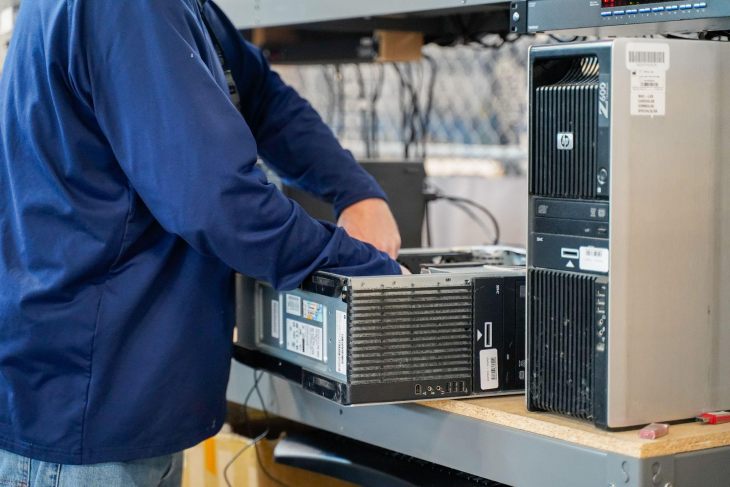The Critical Risks of Ignoring Proper ITAD Procedures

IT asset disposition (ITAD) is playing an increasingly important role in data security, sustainability, and compliance. ITAD addresses the critical end-stages of IT lifecycle management by helping organizations to safely, responsibly, and securely dispose of their unwanted IT equipment. That includes everything from laptops and desktop computers to servers, printers, storage devices, networking equipment, and mobile phones.
ITAD generally begins with secure data destruction, which ensures that unauthorized parties can never access information from old devices. ITAD service providers then process each piece of equipment, often repairing and reselling it to recapture as much residual value as possible. Any remaining devices are then recycled, protecting the environment and contributing to the circular economy.
In addition to preventing data breaches, these steps help organizations meet a growing number of regulatory compliance and sustainability objectives.

Data Security Risks
Leaving sensitive data on devices that are not properly wiped or destroyed poses significant security risks. In fact, companies may not even be aware that certain devices contain hard drives that store potentially sensitive information. In 2017, Affinity Health Plan was fined over $1.2 million for inadvertently exposing patients’ medical records stored on a fleet of leased copiers. They returned those machines to the lessor without first destroying the data they contained, which constituted a HIPAA violation.
Morgan Stanley offers another example of a high-profile incident that highlights the security risks – and the severe financial consequences – of improperly disposing of IT assets. The company paid $60 million in fines and faced multiple lawsuits after decommissioned servers and other devices showed up for sale on eBay, with hundreds of thousands of customer records intact.
These kinds of incidents underscore the critical importance of working with a reputable ITAD service provider to ensure that data is permanently and irretrievably destroyed before devices can be sold, donated, or recycled.
Legal and Regulatory Risks
Most organizations must comply with a dizzying array of regulations, industry standards, and customer compliance requirements. Organizations that process healthcare information must comply with HIPAA. Financial institutions are subject to the Gramm-Leach-Bliley Act (GLBA). Federal contractors, colleges & universities, and numerous others must adhere toNational Institute of Standards and Technology ( NIST) standards, either by law or by agreement with important trading partners. And virtually everyone is subject to the EU General Data Protection Regulation (GDPR), the U.S. California Consumer Privacy Act (CCPA), and similar far-reaching privacy regulations.
Those are just the regulations and standards that protect the privacy and security of sensitive information. Most organizations must also comply with a growing array of local, state, and national laws that govern sustainability and environmental impact.
Compliance failures can lead to severe negative consequences, including hefty fines, legal action, lost revenue, and long-term reputational damage. To avoid these risks, organizations must implement robust data protection measures. ITAD services from a reputable provider are the best way to maintain compliance.

Environmental Risks
Improper disposal of electronic waste (e-waste) poses significant environmental risks, including the release of toxic materials such as lead, mercury, and cadmium into the environment. These hazardous substances can leach into soil and water, leading to long-term pollution that harms entire ecosystems and threatens public health. Moreover, when e-waste is sent to landfills, society loses a valuable opportunity to recycle materials and preserve our world’s resources.
Non-compliance with environmental regulations can often lead to financial penalties, legal action, and reputational damage. States, provinces, and municipalities often have specific rules regarding disposal of e-waste, making compliance especially difficult for organizations that span multiple geographies. Regulations are constantly evolving, so companies must constantly monitor the changing legal environment to avoid running afoul of the law.
By disposing of e-waste responsibly, companies can achieve higher metrics for corporate social responsibility (CSR) and sustainability, demonstrating their commitment to reducing environmental impact and supporting a circular economy. By following sustainable ITAD practices, companies can enhance their corporate image and contribute to global efforts to protect the environment.
Financial Risks
When companies fail to follow best practices in IT asset disposition, they risk potentially large financial losses. When obsolete IT equipment sits around for an extended period, there is a significant risk that items could be stolen or misplaced. Inaction exposes companies to legal and regulatory risks, lost revenue, and a decline in asset value due to rapid obsolescence.
ITAD service providers help organizations to recover residual value from their unwanted IT assets, typically by refurbishing and reselling salvageable equipment, and sometimes by facilitating donations to charity. When IT assets reach the end of their useful life, they still often hold considerable value in the form of resale, recycling, or component harvesting. Without a structured ITAD process, companies miss out on the opportunity to recoup a portion of their initial investment, leading to unnecessary write-offs and reduced capital efficiency. This lost value can compound over time, especially for large organizations with substantial IT infrastructure.
Reputational Risks
Improper IT asset disposition has the potential to significantly damage a company’s reputation, leading to a loss of customer trust and negative publicity. When sensitive data is not properly erased from decommissioned hardware, for example, it may lead to the release of confidential customer information, violating privacy laws and eroding consumer confidence.
Likewise, when companies appear to be mishandling IT assets in a way that negatively affects the environment, public opinion is likely to turn against them. When e-waste ends up in landfills or is disposed of illegally, the original owners of the equipment will suffer from negative publicity.
The growing importance of ethical business practices cannot be overstated. Consumers and investors are more inclined to support companies that demonstrate a commitment to ethical standards, including responsible ITAD practices.
Best Practices for Proper ITAD
Organizations can mitigate the risks associated with IT asset disposition by implementing a clear and comprehensive ITAD policy, ensuring regular employee training on data security and asset management practices, and conducting frequent audits of their ITAD processes to identify and address any potential weaknesses.
Develop a comprehensive IT lifecycle management policy that incorporates best practices in IT asset disposition. Look for a reputable ITAD company that can offer guidance for developing such policies. The best providers have certifications from organizations like e-Stewards, attesting to their high standards for data security, environmental responsibility, and ethical practices.
Augment your written policies with regular employee training and routine audits, ensuring that all staff understand the importance of protecting sensitive data and complying with environmental regulations, while also enabling continuous improvement of ITAD processes.
Conclusion
Improper IT asset disposition poses significant risks to businesses, so it is imperative that they take proactive steps to ensure secure, compliant, and environmentally responsible ITAD. By partnering with certified ITAD providers, companies can protect their data, adhere to industry regulations, and contribute to sustainability efforts by responsibly recycling or repurposing electronic waste. Implementing robust ITAD processes not only safeguards sensitive information but also demonstrates a commitment to corporate social responsibility and environmental stewardship.
Want to learn more about proper ITAD practices for your company? Contact an expert at NCS Global today.
